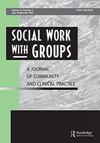多面手小组课程中的体验式学习:BSW和MSW学生的技能和过程
引用次数: 0
摘要
摘要体验式学习提供了对小组工作原理的基本理解。本定性研究对社会工作学士和社会工作硕士课程的大多数女性、黑人、土著和有色人种(BIPOC)学生进行了评估学生学习经验的研究。学生促进小组,被要求观察和评估他们同伴的促进技能。数据收集自观察反馈表格,并采用专题分析。本研究结果显示,团体课程在学生学习和理解团体过程、凝聚力、包容和促进技能的力量方面是有效的。这些技巧包括帮助团队保持正轨,提供反馈,以及在必要时使用对抗。此外,体验组有几个意想不到的学习结果:a)学生了解了群体多样性和包容性的重要性,b)干预对小组成员有不同的结果,c)沉默在小组处理技能中的作用。关键词:团体治疗体验式学习社会工作实践披露声明作者未报告潜在的利益冲突。本文章由计算机程序翻译,如有差异,请以英文原文为准。
Experiential learning in generalist groups courses: skills and process of BSW and MSW students
ABSTRACTExperiential learning provides a foundational understanding of the principles of group work. This qualitative study of majority female-identified, Black, Indigenous, and people of color (BIPOC) students in both Bachelor of Social Work and Master of Social Work programs evaluated the experiences of student learning. Students facilitated groups, were tasked to observe, and evaluate their peers’ facilitation skills. Data were collected from observational feedback forms, and thematic analysis was used. The study’s results indicate that group courses were effective in students’ learning and understanding the power of group process, cohesion, inclusion, and facilitation skills. These skills included helping the group stay on track, providing feedback, and the use of confrontation, when necessary. In addition, the experiential groups had several unanticipated learning outcomes: a) students learned the importance of diversity and inclusion in groups, b) interventions have different outcomes for group members and c) the power of silence in group process skills.KEYWORDS: Group therapyexperiential learningmezzo social work practice Disclosure statementNo potential conflict of interest was reported by the author(s).
求助全文
通过发布文献求助,成功后即可免费获取论文全文。
去求助
来源期刊

Social Work with Groups
Social Sciences-Social Sciences (miscellaneous)
CiteScore
1.30
自引率
0.00%
发文量
22
期刊介绍:
Social Work with Groups is a unique quarterly journal of community and clinical practice, and an important reference publication for those in the social work profession who value and seek to understand the small group. The journal addresses the issues of group work in psychiatric, rehabilitative, and multipurpose social work and social service agencies; crisis theory and group work; the use of group programs in clinical and community practice; and basic group competencies for all social work professionals. The contributions reflect a sophisticated knowledge of the use of the group as a learning medium and a highly developed understanding of instructional technology in the teaching of social group work knowledge and skills.
 求助内容:
求助内容: 应助结果提醒方式:
应助结果提醒方式:


